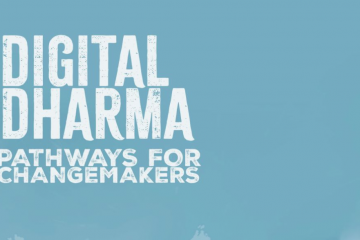Border Narratives: Young Voices Fighting Hate in Thailand–Cambodia Conflict
Since 2024, the border between Thailand and Cambodia has been tense, and in 2025 the conflict continued. Clashes have caused deaths, including children, and hate-filled stories spread online. We spoke with young activists, including youth network of the ASEAN Youth Forum (AYF), to learn how they see the situation and how they are building solidarity across borders.

Nitchakarn Rakwongrit, also known as Memee, is no stranger to political pressure. The young feminist activist from Thailand has already faced seven legal cases, five of them before she had even reached adulthood. “I first became involved in youth activism during the 2020–2021 pro-democracy protests in Thailand and participated in the feminist movement. I have faced seven political cases, five of which occurred while I was still a teenager,” says the young feminist activist, Memee.
The state pressure didn’t stop her. She’s now active in Milk Tea Alliance Thailand, part of the broader Milk Tea Alliance: Friends of Myanmar network. Even though the wave of protests has died down, her advocacy hasn’t. With her group, Memee works to build bridges between young people in Thailand and Myanmar. “We recognize the importance of bridging the gap between Thai and Myanmar youth to enable meaningful collaboration. We don’t want social movements to only hear voices from the stage, we want friends to meet activists and people from Myanmar to hear their stories directly,” She says. From there, various initiatives were born, ranging from Thai Students for Burma to fundraising and solidarity campaigns.
Lately, her focus has turned to Southeast Asia’s digital landscape. Social media, Memee says, has become a key space for governments and interest groups to control the narrative. “Currently, we see a trend across Southeast Asia where social media has become a key space, and those with resources can manipulate narratives. We want to connect the concept of the Milk Tea Alliance with the disinformation trends in Southeast Asia. These trends directly attack democracy and the well-being of local activists,” she says. Together with journalists and Myanmar activists, she has been collecting data on nationalist narratives and disinformation in Thailand throughout 2024–2025, aiming to identify patterns and potential political flashpoints.

Children fleeing the border conflict between Cambodia and Thailand rest on the grounds of a pagoda in Oddar Meanchey province (AFP/Getty)
Now, Memee’s attention is focused on the escalating conflict between Thailand and Cambodia. Clashes at the border have once again caused casualties, including children. “For outsiders, the tension between the two countries may not be visible from the perspective of those living inside. There have been many deaths and injuries, including among children. This incident is extremely serious and should never have happened,”. the tragedy is just the tip of the iceberg. “But we can say with certainty that this is a full-scale information war. It is not just about border clashes or long-standing disputes. People in both countries have developed deep-seated hatred toward each other.”
She notes how the narrative of “who shot first” is deliberately maintained by the state. “Both nations are caught under military information operations, fighting over the narrative of ‘Who shot first’ which was set by the states. Migrant workers have been assaulted inside Thailand,” said Memee. Public figures, influencers, and even pro-democracy figures joined in attacking Cambodia, while Cambodian citizens responded with similar sentiments. “Therefore, this conflict is not limited to the border alone, and its violence has had far-reaching impacts. What needs to be understood is that this is not merely the ‘beginning’ of something, but also the result or outcome of information operations designed to foster hatred toward neighboring countries within Thailand.”
Memee worries that this cycle of hatred will increasingly ensnare the younger generation. There are, of course, voices of resistance, hashtags showing solidarity with Cambodia even trended on Twitter but the mainstream discourse remains nationalist. “I think this is a problem between Thai and Cambodian youth, where trust has been broken. We are victims of propaganda, and we may fall into the trap of arguing with each other exactly as the military wants,” said Meme.

(Image credit: Paula Bronstein/ Getty Images)
According to Memee, the root of the problem has long been planted through the education system. Textbooks glorify the military and teach that conflict is inevitable. “We have been internalized to hate one another since childhood through the Thai education system. Disputes over who ‘owns’ certain cultural elements have long been a recurring issue between the two countries,” Said Memee. “And as mentioned before, this is not the beginning of anything new, but rather the outcome of operations by those who want Thais to embrace extreme nationalism. Nationalist sentiment, alongside loyalty to the monarchy, has been one of the core strategies of ISOC (the Internal Security Operations Command).”
Their approach combines loyalty to the monarchy with nationalism to shape and control public opinion. “Both countries have been taught to hate one another since the education system through textbooks, and needless to say, the media as well. Peace has never been, and is not, the main narrative. We are taught to love the military, to see soldiers as self-sacrificing, that armed conflict is inevitable, and that we must take pride in being Thai and in the military’s battles,” she said.
Even so, there is still room for resistance. When tensions were high, Milk Tea Alliance Thailand and more than 60 groups released a joint statement. They worked together with Cambodian civil society. “From the Thai side, we saw this as a way to demonstrate sincerity by prioritizing the demands of the Cambodian people. The central narrative we wanted to highlight was resistance against information operations and the countering of disinformation,” Memee said.
She believes the region’s human rights mechanisms are too weak to play a meaningful role.
“I think the limitations of ASEAN mechanisms, especially its human rights mechanism, have prevented it from playing a leading role in resolving such problems. I believe ASEAN should take on a much stronger role in seeking solutions or facilitating peace negotiations.”
To young people who feel powerless, Memee has a message:
I want to say that what we are facing is far bigger than ourselves. It is not an event that suddenly erupted out of people’s hatred. Even before this, the Thai right had been trying to target other ethnic groups to stir up nationalism, but those efforts did not succeed until this incident.
Closing the conversation, Memee reminded that resisting this tide is indeed a huge challenge. But she believes that many young people in Thailand and Cambodia still choose the path of peace.
“Resisting this is an enormous challenge. But if you believe in peace, please know that you are not alone. Many young people and ordinary citizens in Thailand are also trying to create narratives that allow Cambodians who share the same belief to feel the support that we reject the conflict and that we believe in cross-border peace.”
See more about our activities on our social media here

Nitchakarn Rakwongrit (Memee) is a young feminist activist based in Bangkok, Thailand. She became involved in the Thai pro-democracy protests in 2020 and has been actively engaged in activism ever since. Despite her young age, she has faced political prosecution in at least seven cases, with five occurring when she was still a minor. Currently, Memee is actively involved with the Milk Tea Alliance Thailand and strives to incorporate feminism and collective culture into social movements.



0 Comments